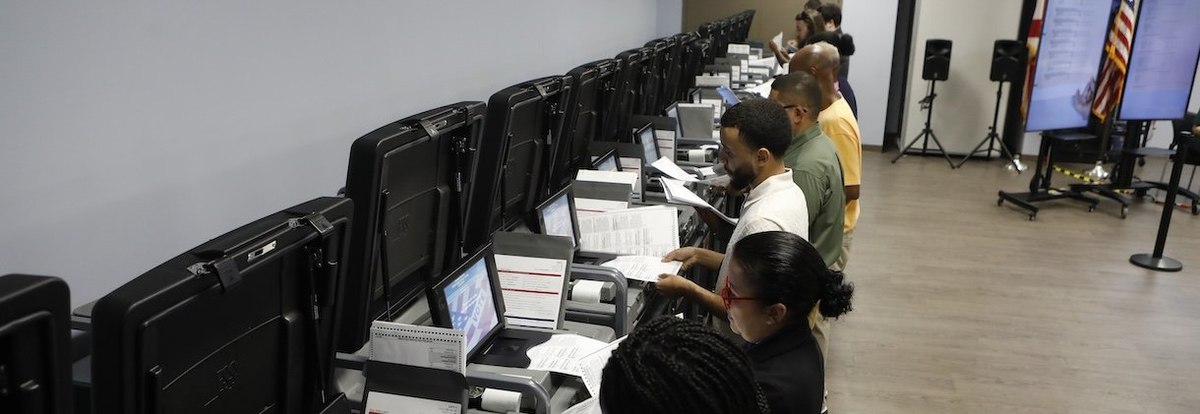This week’s Economist/YouGov poll covers the latest on the election, what people expect about the election's fairness and its aftermath, perceptions of JD Vance, where voters have found out about candidates, hurricanes' impact, and watching baseball.
The election
Harris vs. Trump
- Vice President Kamala Harris leads former President Donald Trump by 48% to 45% among registered voters, little changed from recent weeks
- Harris leads by 4 points among likely voters — those who either have voted, say they definitely will vote, or both say they will probably vote and also have voted in either 2020 or 2022
- Nearly all supporters of Harris (97%) and Trump (98%) believe their minds will not change
- Slightly more registered voters say they think Harris will win than say they think Trump will (41% vs. 37%)
About two-thirds of both Democrats and Republicans say they are very or extremely enthusiastic about voting for president
- Harris leads by 51% to 47% among registered voters choosing only between her and Trump; 2% say they prefer both equally
- Among likely voters, Harris leads among college graduates, women, and Black and Hispanic Americans; Trump leads among non-college graduates, men, and white Americans
Fairness and the aftermath
- Most Harris supporters approve of voting by mail: 89% strongly or somewhat approve, while 7% disapprove
- Most Trump supporters disapprove of voting by mail: 27% approve, while 66% disapprove
- 44% of Harris supporters and 26% of Trump supporters say they will be voting by mail or absentee ballot
- As was the case in 2016 and 2020, Trump supporters are more concerned about the fairness of the voting process than are supporters of his Democratic opponent: Only 16% are very confident their own vote will be counted accurately, compared with 72% of Harris supporters who say this — a bigger gap than in 2016 or 2020
- Far more Harris supporters than Trump supporters say they have a great deal of confidence that the election will be held fairly (60% vs. 8%)
- Majorities of supporters of Harris and Trump say that if their preferred candidate wins, mass protests — presumably by the supporters of the losing candidate — are somewhat or very likely
Perceptions of the candidates and running mates
- Harris and her running mate Tim Walz are viewed more favorably by Americans than Trump and his running mate JD Vance
- Last week, after the vice presidential debate, Vance saw an increase in popularity; now Americans' evaluations of Vance are about as negative as they were before the debate
- 40% of registered voters — including 77% of Harris supporters and 1% of Trump supporters — say they think Trump's health and age would severely limit his ability to do the job of president, if he were elected in November
- 59% of registered voters say Harris is very or somewhat intelligent, as do 54% about Trump
- Nearly half (46%) of registered voters say the economy will get better if Trump is elected; 37% say the same about a Harris victory
- Nearly half (48%) of Americans say Harris is spending more of her time explaining what she will do if elected president than attacking Trump, while 37% say she is spending more time attacking
- In contrast, 37% of Americans say Trump is spending more of his time explaining his plans while 53% say he is spending more time attacking
Learning about the candidates
- Candidate interviews (especially on television), debates, and social media are the largest ways that registered voters this year have learned something new about Harris
- Most Harris supporters have learned something new about Harris from television news interviews and debates
- Fewer Trump supporters have learned anything new about Trump: 19% say they haven’t learned anything new about Trump this year from any of the 11 information sources asked about, compared to 5% of Harris supporters who say the same about learning new things about Harris
- 32% of registered voters say they learned something new about Harris from campaign ads, and 26% say the same about Trump
- After the Democratic National Convention, 40% of registered voters said they wanted to see and hear more of Harris; now that percentage has dropped to 34%
Hurricanes
- More Americans say they know someone who has been directly affected by either Hurricane Helene or Hurricane Milton — or were affected themselves — than said a week earlier, before Milton made landfall, that they knew someone affected by Helene
- Last week's poll found that 32% of Americans knew of someone affected by Helene; now, nearly half (47%) know someone affected by either of the two hurricanes
- In the states affected by Helene and Milton, more than half know an affected person
Baseball
- Nearly half of all Americans (46%) say they have no interest in Major League Baseball, and few of this group (2%) have seen any playoff games
- But 25% of Americans say they have been watching, and even more (34%) plan to watch the World Series
- 90% of those who call MLB one of their top interests plan to watch the World Series; 73% of those who are somewhat interested in MLB also plan to watch
- With two New York teams, the Los Angeles Dodgers, and the Cleveland Guardians still in the playoffs, plans to watch the World Series are highest among Americans in the Northeast (41% say they will watch) and the West (39%) — percentages that likely will change once it’s known which two teams make the World Series
Throughout this report, some numbers may appear to be off by 1 because of rounding
— Carl Bialik and Taylor Orth contributed to this article
See the toplines and crosstabs for the October 12 - 15, 2024 Economist/YouGov Poll
Methodology: The poll was conducted among 1,624 U.S. adult citizens. Respondents were selected from YouGov’s opt-in panel to be representative of U.S. adult citizens. A random sample (stratified by gender, age, race, education, geographic region, and voter registration) was selected from the 2019 American Community Survey. The sample was weighted according to gender, age, race, education, 2020 election turnout and presidential vote, baseline party identification, and current voter registration status. Demographic weighting targets come from the 2019 American Community Survey. Baseline party identification is the respondent’s most recent answer given prior to November 1, 2022, and is weighted to the estimated distribution at that time (33% Democratic, 31% Republican). The margin of error for the overall sample is approximately 3%
Image: Getty (Kent Nishimura / Stringer)
What do you think about the election, American politics in general, and everything else? Have your say, join the YouGov panel, and get paid to share your thoughts. Sign up here.















